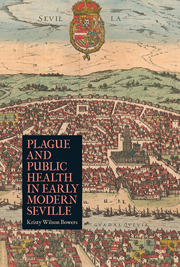Book contents
- Frontmatter
- Dedication
- Contents
- Acknowledgments
- Introduction
- 1 Early Modern Seville: Balancing Growth and Governance
- 2 Perceptions of Plague: Balancing Disease Concepts
- 3 Negotiating Public Health: Balancing the Individual and the Community
- 4 The Wider Politics of Public Health: Balancing Urban and Rural
- 5 City and Crown: Balancing Authorities
- Conclusion
- Notes
- Bibliography
- Index
Conclusion
Published online by Cambridge University Press: 05 October 2013
- Frontmatter
- Dedication
- Contents
- Acknowledgments
- Introduction
- 1 Early Modern Seville: Balancing Growth and Governance
- 2 Perceptions of Plague: Balancing Disease Concepts
- 3 Negotiating Public Health: Balancing the Individual and the Community
- 4 The Wider Politics of Public Health: Balancing Urban and Rural
- 5 City and Crown: Balancing Authorities
- Conclusion
- Notes
- Bibliography
- Index
Summary
The plagues and pestilence of the early modern era continue to fascinate in part because they defy clear definition. Plague was more than a diagnosis, it was a multifaceted and changeable idea that held many different, and sometimes conflicting, meanings. Both feared and ignored, it was a constant, albeit not a continual, threat. Perceived as both unpredictable and yet controllable, its effects were felt in nearly all aspects of European life for several centuries. This particular complexity of plague, taken within a more generally complex understanding of all disease, gave rise to an intricate system of public health that depended on cooperative effort by both authorities and residents.
The disruptive and often devastating effects of plague have been well-documented. The intense fear, isolation, and abandonment vividly described by fourteenth-century chroniclers, picked up and recounted by historians in later centuries, continues to shape a common understanding of the Black Death and the subsequent plague era. This study seeks not to erase those negative images, but merely to add another perspective to them—that of acceptance and adaptation. In a way that no other disease did, plague forced early modern populations to adapt their routines, attitudes, and expectations to its persistent threat.
The study of plague has been traditionally framed by two distinct but intertwined contexts, that of a communal crisis and that of a medical crisis. As a communal crisis, the fear of epidemics created chaos by encouraging self-preservation, breaking down social bonds (the abandonment often chronicled from the Black Death), and placing sufficient stress on cultural and religious traditions that many of these traditions changed or gradually disappeared.
- Type
- Chapter
- Information
- Plague and Public Health in Early Modern Seville , pp. 100 - 106Publisher: Boydell & BrewerPrint publication year: 2013



